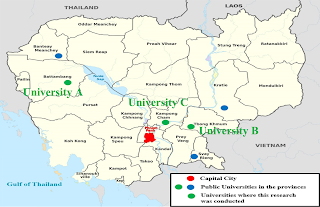IJCED vol 22: Information literacy training effectiveness on Cambodia's province-based undergraduates
This work is led by Cheyvuth Seng, former dean at the National University of Battambang who completed his doctoral studies at the Cross Lab.
 |
| Target universities in Cambodia for this paper |
For a copy of relevant materials (e.g., presentation, paper) or any questions you may have, please feel free to reach out to me through the Contact Me gadget on this blog's side bar.
Details
Title: Information literacy training effectiveness on Cambodia's province-based undergraduates
Authors: Cheyvuth Seng, May Kristine Jonson Carlon, Jeffrey S. Cross
Specifics: Volume 22, Number 4, September 7, 2020, pages 263 to 280, Emerald Publishing Limited
DOI: 10.1108/IJCED-11-2019-0057 ($$)
Abstract
Purpose
This study is aimed at determining the effect of a short-term information literacy training activity on the self-efficacy of undergraduate students at province-based universities in Cambodia.
Design/methodology/approach
A three-week training intervention was administered to 461 undergraduate students at three province-based public universities in Cambodia. The participants answered an information literacy self-efficacy questionnaire before and after the intervention.
Findings
The students' level of information literacy self-efficacy has a low mean score of 2.23 on a five-point scale before the training. After the training, the score dramatically increased to 3.64 and was statistically significant (p-value < 0.001). This indicates that short-term information literacy self-efficacy training is an effective means to promote information literacy among students.
Research limitations/implications
This research scope was limited to examining the effect of a short-term intervention on a particular population. Further improvements include analyzing the training effects over the long term, soliciting qualitative feedback from respondents, and gathering previous relevant training data.
Practical implications
There is a need for a carefully designed curriculum to be implemented that focuses on introducing information and communication technology (ICT) while considering its potential application to research activity. To be able to make meaningful curriculum changes, there must be a systematic way of identifying the ICT needs that are most urgent among undergraduate students in province-based Cambodian universities.
Originality/value
This research focuses on implementing ICT training and measuring its effectiveness on Cambodian undergraduate students in province-based universities, a growing population that has immense potential in influencing the country's growth but whose information literacy self-efficacy remains largely understudied until now.
Comments
Post a Comment